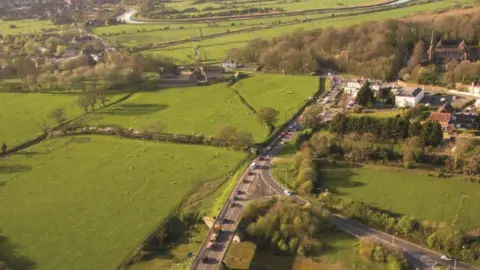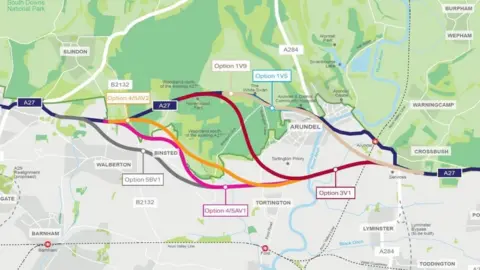A27 Arundel bypass 'will destroy woodland'
 Highways England
Highways EnglandPlans to improve a congested road through a national park would lead to the "destruction of valuable woodlands", rural campaigners said.
Five of the six options for the A27 near Arundel involve building new roads in the South Downs National Park.
The proposals "fly in the face" of local councils' commitment to tackle "climate emergency," the Campaign to Protect Rural England (CPRE) said.
Highways England said it would ease congestion and tackle deprivation.
It has put forward six proposed routes for the project, which will replace a "bottleneck" stretch of single carriageway, and involves the loss of between 1.49 and 20.57 hectares of woodland.
It is the second public consultation, launched after Highways England "discovered new information" about the impact of their initial proposals, which were met with protests from residents in 2017.
Up to £250m has been allocated for the project, but Highways England estimates the works will cost between £195m and £455m.

Kia Trainor, of the Sussex branch of the CPRE, said: "Road building on this scale just isn't compatible with the county's new emissions targets."
She said money should instead be spent on improving rail and bus services.
She said Highways England had "completely failed to consider this option, which is shocking".
 Highways England
Highways EnglandHighways England said use of public transport, walking and cycling in the district was low, with more than 70% of people in the area travelling to work by car.
As a result, it said "this means that even a significant increase in these modes of transport would be unlikely to solve the problems of queuing and congestion on the A27 through Arundel".
It acknowledged the area was "very special in environmental terms" and said "high-level provision has been made for environmental mitigation," including "new woodland creation".
It added "green bridges" could be built to "facilitate safer animal crossings of the A27".
Highways England said "relatively poor transport connectivity" in the area had contributed to "pockets of deprivation" in towns like Littlehampton, which it said had "some of the highest levels of deprivation in the country".
